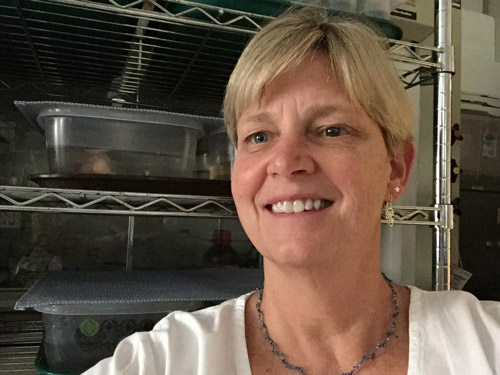Professor of Biology Karen Crawford Presents “CRISPR-Cas9 Genome Editing in the Cephalopod Doryteuthis (Loligo) pealeii” at the Annual Meeting for the Society for Integrative and Comparative Biology Karen Crawford January 29, 2020 - 10:49 am
January 29, 2020

Professor of Biology Karen Crawford's presentation was selected as an oral presentation in a complementary session in the 2020 SICB Symposium "Building Bridges from Genome to Phenome: Molecules, Methods and Models," held January 3-7, in Austin Texas.
This presentation represents an important breakthrough for her research and impacts the work of many scientists studying the development, neurogenesis and evolutionary relationships of cephalopods, animals including: squid, octopus, cuttlefish and nautilus. It is an important “proof of concept” study demonstrating the first successful use of CRISPR-Cas9 technology to employ genome editing in a cephalopod species. In this study, Crawford used the CRISPR-Cas9 system with specific RNA guides to the Tryptophan 2,3 dioxygenase enzyme (TDO) to specifically knock out the first step in the ommochrome pigment pathway in squid embryos. In English, this means that she successfully knocked out one gene to generate completely normal embryos lacking only reddish brown pigmentation. This work is in preparation for publication. Expanding the study of cephalopods to include predictable genome editing, the knocking out and knocking in of specific genes, opens an important door to our understanding of the molecular mechanisms that drive normal development, neurogenesis, and behavior in cephalopods; a group of diverse and evolutionarily successful organisms that possess not only a camera like eye similar to our own along with the largest and most complex invertebrate brain on the planet, but also our imagination for their extraordinary life histories and complex cognitive behaviors.
While most of this work is performed at the Marine Biological Laboratory (MBL), Woods Hole, Massachusetts, students working on their St. Mary’s Projects, often choose to explore fundamental questions of developmental biology of cephalopods by working with preserved embryos in the Crawford laboratory at SMCM. Last year, Sylvia Klein explored the role of Mitogen Activated Protein Kinase (MAPK) on two cephalopod species. As part of her SMP work, Sylvia was the first to observe the conservation of MAPK expression in the Pajama squid embryo, complementing studies Crawford had done with embryos of the long-finned squid, Doryteuthis pealii. Before graduate school, Sylvia, is expanding her experiences as a research assistant in the laboratory of Karen Echeverri at the MBL, where she is studying regeneration in both invertebrate and vertebrate species.
This work has most recently been supported by fellowships from the Marine Biological Laboratory (MBL) to Crawford (2018, 2019), as well as a National Science Foundation - Enabling Discovery Through GEnomic Tools (EDGE) Grant to the MBL for which Crawford is a Principle Investigator. That grant supports the Cephalopod Strategic Initiative at the MBL.
January 29, 2020

Professor of Biology Karen Crawford's presentation was selected as an oral presentation in a complementary session in the 2020 SICB Symposium "Building Bridges from Genome to Phenome: Molecules, Methods and Models," held January 3-7, in Austin Texas.
This presentation represents an important breakthrough for her research and impacts the work of many scientists studying the development, neurogenesis and evolutionary relationships of cephalopods, animals including: squid, octopus, cuttlefish and nautilus. It is an important “proof of concept” study demonstrating the first successful use of CRISPR-Cas9 technology to employ genome editing in a cephalopod species. In this study, Crawford used the CRISPR-Cas9 system with specific RNA guides to the Tryptophan 2,3 dioxygenase enzyme (TDO) to specifically knock out the first step in the ommochrome pigment pathway in squid embryos. In English, this means that she successfully knocked out one gene to generate completely normal embryos lacking only reddish brown pigmentation. This work is in preparation for publication. Expanding the study of cephalopods to include predictable genome editing, the knocking out and knocking in of specific genes, opens an important door to our understanding of the molecular mechanisms that drive normal development, neurogenesis, and behavior in cephalopods; a group of diverse and evolutionarily successful organisms that possess not only a camera like eye similar to our own along with the largest and most complex invertebrate brain on the planet, but also our imagination for their extraordinary life histories and complex cognitive behaviors.
While most of this work is performed at the Marine Biological Laboratory (MBL), Woods Hole, Massachusetts, students working on their St. Mary’s Projects, often choose to explore fundamental questions of developmental biology of cephalopods by working with preserved embryos in the Crawford laboratory at SMCM. Last year, Sylvia Klein explored the role of Mitogen Activated Protein Kinase (MAPK) on two cephalopod species. As part of her SMP work, Sylvia was the first to observe the conservation of MAPK expression in the Pajama squid embryo, complementing studies Crawford had done with embryos of the long-finned squid, Doryteuthis pealii. Before graduate school, Sylvia, is expanding her experiences as a research assistant in the laboratory of Karen Echeverri at the MBL, where she is studying regeneration in both invertebrate and vertebrate species.
This work has most recently been supported by fellowships from the Marine Biological Laboratory (MBL) to Crawford (2018, 2019), as well as a National Science Foundation - Enabling Discovery Through GEnomic Tools (EDGE) Grant to the MBL for which Crawford is a Principle Investigator. That grant supports the Cephalopod Strategic Initiative at the MBL.
